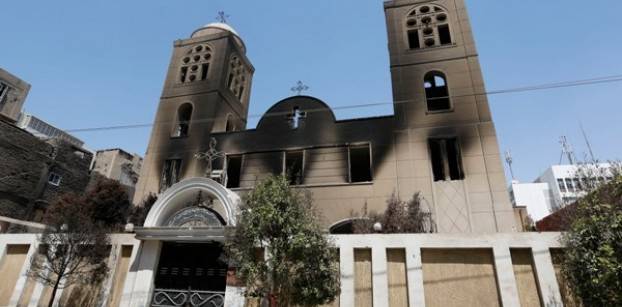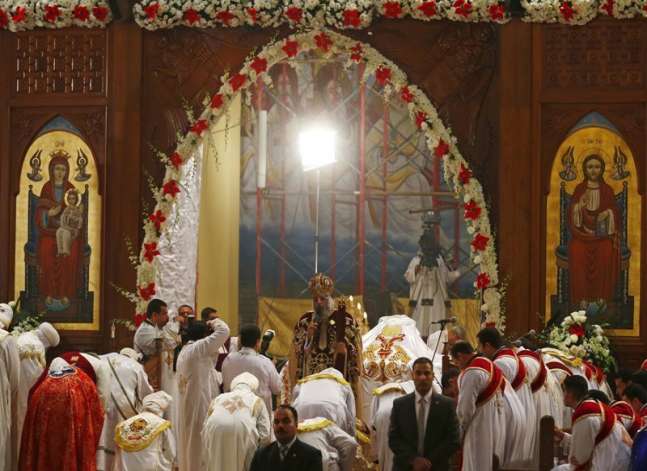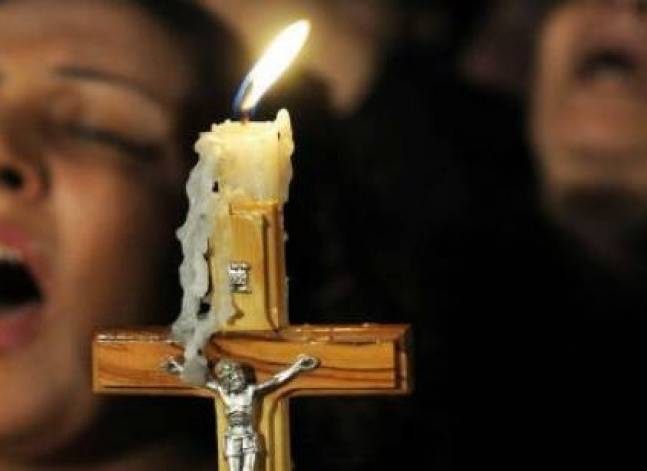Latest NEWS
- Aswat Masriya, the last word
- Roundup of Egypt's press headlines on March 15, 2017
- Roundup of Egypt's press headlines on March 14, 2017
- Former Egyptian President Hosni Mubarak to be released: lawyer
- Roundup of Egypt's press headlines on March 13, 2017
- Egypt's capital set to grow by half a million in 2017
- Egypt's wheat reserves to double with start of harvest -supply min
- Roundup of Egypt's press headlines on March 12, 2017
Church construction law legitimises religious discrimination, says study
The burnt and destroyed Evangelical Church are seen in Mallawi at Minya governorate, about 245 km (152 miles) south of Cairo August 17, 2013. REUTERS/Stringer
CAIRO, Nov 2 (Aswat Masriya) - The Egyptian Initiative for Personal Rights (EIPR) called on the parliament to amend the church construction law, saying it legitimises an already dire condition for Copts in Egypt, in a report issued on Wednesday.
The amendments, EIPR said, should omit the condition of acquiring prior permits from security and administrative officials to build churches based on the “number of Christian residents in the neighbourhood.”
This article in particular has been a source of controversy even among members of parliament.
According to the study, titled “Closed for Security Reasons,” the law legitimises the ongoing discrimination between Egyptians in practicing their rituals by imposing a set of complicated conditions for building a church, and giving security bodies and exclusive mandate to approve church construction.
Furthermore, discussion around the bill before its ratification were limited to representatives from the church, the government and excluded any representatives from civil society organisations, and even members of parliament, EIPR said.
Restrictions around building churches are not only from security officials, but are also imposed by fellow citizens who do not want churches in their neighbourhood, the report said.
Most of the recent attacks against Copts also went uninvestigated and ended with customary reconciliation sessions, according to EIPR.
At least 77 incidents of sectarian violence incidents were documented since 2011 with 10 incidents in 2016 for reasons related to the building and renovation of churches.
Only 11 permits for building churches were granted since 2011, the report said, which is significantly low. Seven of those approvals were issues under President Abdel Fattah al-Sisi’s rule.
The study also stated that there are more than 49 churches closed for security reasons and were never reopened, including one that has been closed since 1995.
Amid restrictive conditions to build churches, many Copts resorted to discreetly turning regular buildings into churches. According to the study, priests who use those “home churches” also face persecution by security and Muslim neighbours.
Some of the existing churches’ infrastructure has also become life threatening and while many of those churches already acquired an approval for renovation, the renovation was never put into effect, the study further noted. Among those churches is Anba Karas Church in Sohag that was built in 2015 and witnessed clashes between its priest, security officials and neighbours until it was reopened.
“Even if the church construction permit was acquired, it might not be implemented due to security and citizens’ pressure against it,” EIPR said.
The study concluded with a set of recommendations in a bid to promote equality among citizens in practicing their religious rituals. It called on civil society organisations to keep pushing for suggested amendments on the church construction law and for the government representatives to be transparent in previewing the status of churches.














